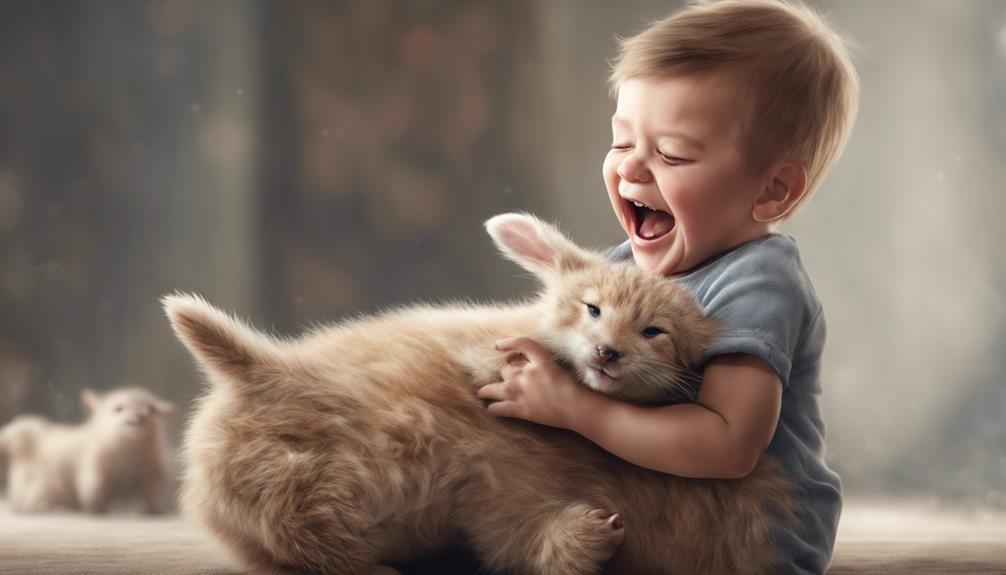Investigating the domain of biting behavior is fascinating. Research indicates that a considerable portion of people feel an urge to bite at some moment in their lives. The complexity of this action extends further than just a simple physical reaction, exploring the detailed network of psychological reasons behind it.
From instinctual territorial marking to the expression of intense emotions, biting behavior unveils a fascinating array of insights into human psychology.
Curious to uncover the hidden layers behind this seemingly primal act?
Key Takeaways
- Biting triggers positive brain responses and releases endorphins, influencing cognitive processing.
- Cute Aggression moderates overwhelming positive emotions, distinguishing playful from true aggression.
- Territorial marking through love bites signifies possession and bonding, affecting power dynamics in relationships.
- Biting serves as a subtle way to exert power, show affection, and stabilize positions in relationships.
Psychological Motivations for Biting
Exploring the psychology behind biting behavior reveals intricate dynamics of human interaction and emotional expression. Emotional expression through biting serves as a non-verbal communication tool, allowing individuals to convey feelings that words may fail to articulate.
In the realm of relationship bonding, biting can signify intimacy, trust, and vulnerability between partners. It acts as a mutual agreement, a shared language that strengthens the connection between individuals. This act not only fosters a sense of belonging but also establishes a unique form of physical closeness that transcends mere words.
Understanding Cute Aggression

Understanding Cute Aggression involves examining the dual nature of positive and negative emotions expressed through biting behavior. This phenomenon, characterized by overwhelming feelings of affection translating into a desire to nibble or bite, has roots in our evolutionary origins.
When faced with an extremely cute stimulus, such as a baby or a beloved pet, the brain can struggle to regulate the intense surge of positive emotions, leading to a coping mechanism where a mild form of aggression is displayed. This coping mechanism serves as a way to moderate these overpowering feelings, allowing individuals to manage the intensity of their emotions.
The Role of Territorial Marking
What evolutionary factors contribute to the phenomenon of territorial marking through biting behavior?
Territorial marking, often exhibited through love bites or hickeys, serves a dual purpose of signifying possession and enhancing relationship bonding.
The influence of oxytocin, known as the 'love hormone,' plays a crucial role in promoting aggressive behavior during intimate moments, further solidifying the bond between partners.
Biting triggers the release of endorphins, impacting cognitive processing and reinforcing positive associations with the territorial marking act.
By engaging in such behavior, individuals may also assert power or control within the relationship dynamics.
This intricate interplay of oxytocin influence and relationship bonding underscores the significance of territorial marking through biting in the realm of human behavior and social interactions.
Benefits of Biting Behavior

The intricate interplay of oxytocin influence and relationship bonding observed in territorial marking through biting behavior underscores the various benefits associated with engaging in such behaviors.
- Emotional regulation: Biting behavior can aid in controlling and expressing intense emotions, promoting emotional balance and self-awareness.
- Stress relief: The release of endorphins triggered by biting can act as a natural stress reliever, helping individuals relax and unwind.
- Cognitive processing enhancement: Biting, particularly in the form of love bites, activates brain regions essential for cognitive functions, potentially improving mental clarity and focus during intimate moments.
These benefits highlight the multifaceted nature of biting behavior, showcasing its potential to contribute positively to emotional well-being and relationship dynamics.
Power Dynamics in Biting
Investigating the subtle dynamics of power exchange and emotional expression through biting behavior reveals intriguing insights into relationship interactions. Exploring dominance and affection dynamics in biting behavior uncovers how individuals establish and maintain power dynamics in relationships.
Biting can serve as a subtle way to exert dominance or gain the upper hand within a relationship. It may signify a desire to stabilize one's position or show reliance and comfort with a partner. Emotional bonding through biting can strengthen the connection between individuals, creating a unique form of intimacy.
Frequently Asked Questions
Can Biting Behavior Be a Sign of Underlying Psychological Issues or Trauma?
When we consider if biting behavior might signal deeper psychological issues or trauma, it's crucial to delve into the potential emotional triggers behind such actions.
Behavioral analysis can uncover the psychological implications of biting, shedding light on underlying trauma effects.
Examining the roots of this behavior allows us to understand its significance in a person's emotional landscape, offering insights into their past experiences and current challenges.
How Does Cultural Background Influence the Perception and Acceptance of Biting Behavior in Relationships?
Cultural influences play a significant role in shaping our perception and acceptance of biting behavior in relationships. Different backgrounds can amplify or diminish the significance of this act, impacting relationship dynamics.
Understanding these cultural nuances is crucial for fostering intimate connections. Observing how diverse backgrounds influence such behaviors offers valuable insights into the complexities of human interaction.
These insights help us navigate relationships with sensitivity and awareness.
Are There Any Potential Risks or Negative Consequences Associated With Engaging in Biting Behavior?
Engaging in biting behavior may lead to potential consequences and psychological implications. It could result in physical harm, miscommunication, or emotional distress if not consensually agreed upon. Understanding boundaries and communication is crucial to avoid negative outcomes.
Psychological effects may include reinforcing power dynamics or causing discomfort if not understood within the relationship context. Consensual biting, when communicated effectively, can enhance intimacy and connection, but it's essential to navigate potential risks.
Is There a Correlation Between Biting Behavior and Other Forms of Physical Aggression in Relationships?
When examining aggression patterns in relationships, we notice intriguing connections between biting behavior and other forms of physical aggression.
Relationship dynamics often involve power struggles, and biting can serve as a subtle way to exert dominance or affection.
Understanding these dynamics can shed light on the complexities of intimate interactions and how biting behavior may reflect deeper emotional currents within a relationship.
How Can Individuals Communicate Their Boundaries and Preferences Regarding Biting to Their Partners Effectively?
When setting boundaries and communicating preferences about biting to partners effectively, we emphasize clarity and mutual respect. Sharing desires openly fosters understanding and strengthens intimacy.
It's vital to establish a safe space for dialogue, ensuring both parties feel heard. By discussing boundaries with honesty and respect, we create a foundation for healthy and consensual interactions.
Effective communication can enhance trust and deepen the connection between partners, promoting a fulfilling relationship.
Can a Hot-Cold Guy’s Mixed Signals be Linked to Biting Behavior Psychology?
The behavior of a hot-cold guy and his mixed signals in relationships can indeed be linked to biting behavior psychology. Understanding mixed signals in relationships involves recognizing that this behavior may stem from a person’s internal conflicts or unresolved emotions, leading to inconsistent and confusing actions towards their partner.
Conclusion
In conclusion, as we peel back the layers of biting behavior, we uncover a tapestry of complexity and intrigue. From the paradoxical cuteness of aggression to the primal urge of territorial marking, biting serves as a fascinating window into the depths of human psychology.
As we navigate the power dynamics and benefits associated with this behavior, we're reminded of the intricate dance of emotion and expression that shapes our interactions with others. In the realm of biting, the bite is truly mightier than the bark.









